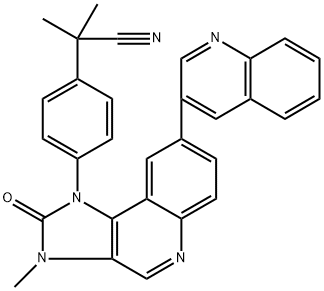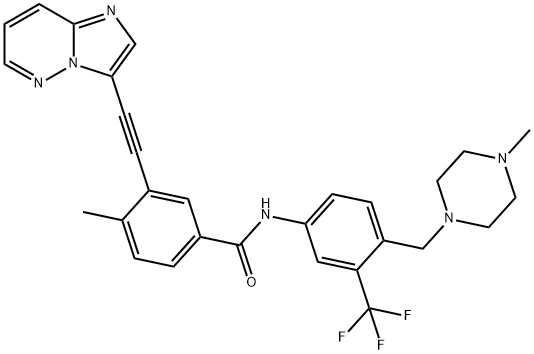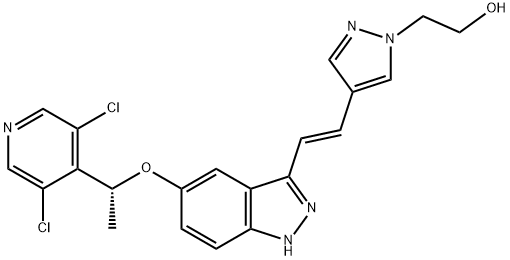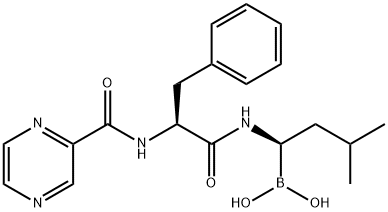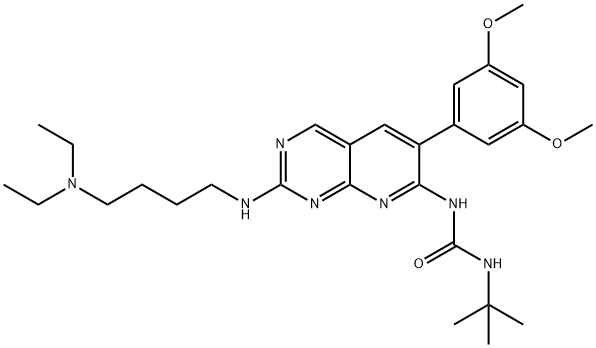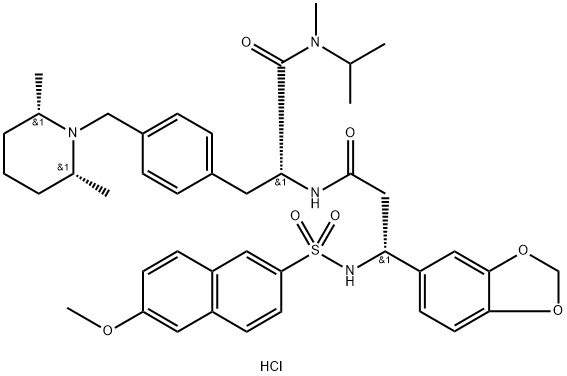FGFR inhibitor
- CAS NO.:848318-25-2
- Empirical Formula: C18H15N2NaO4
- Molecular Weight: 346.31247
- MDL number: MFCD25976751
- SAFETY DATA SHEET (SDS)
- Update Date: 2024-11-19 23:02:33
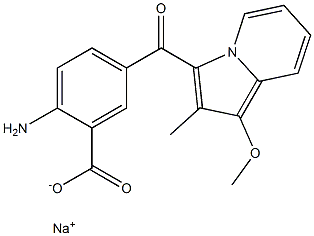
What is FGFR inhibitor?
The Uses of FGFR inhibitor
SSR128129E (SSR) is an potent FGFR inhibitor, which inhibits fibroblast growth factor receptor (FGFR). Oral delivery of SSR128129E inhibits arthritis and tumors that are relatively refractory to anti-vascular endothelial growth factor receptor-2 antibodies.
Definition
ChEBI: Sodium 2-amino-5-[(1-methoxy-2-methylindolizin-3-yl)carbonyl]benzoate is an organic sodium salt having 2-amino-5-[(1-methoxy-2-methylindolizin-3-yl)carbonyl]benzoate as the counterion. It has a role as an antineoplastic agent and a fibroblast growth factor receptor antagonist. It contains a 2-amino-5-[(1-methoxy-2-methylindolizin-3-yl)carbonyl]benzoate.
Biological Activity
ssr128129e is an allosteric inhibitor of fgfr1 with ic50 value of 1.9 μm [1].the fibroblast growth factor receptors (fgfrs) are receptor tyrosine kinases for fibroblast growth factors (fgfs) and play an important role in cancer and inflammation. fgf2 plays an important role in angiogenesis [1] [2].ssr128129e is an orally-active and allosteric fgfr1 inhibitor. in human umbilical venous endothelial cells (huvecs), ssr128129e inhibited fgf2-induced endothelial cells (ecs) proliferation and migration with ic50 values of 31 and 15.2 nm respectively and also inhibited lamellipodia formation. ssr128129e inhibited responses mediated by fgfr1-4. in fgfr2-expressing hek293 cells, ssr128129e inhibited phosphorylation of frs2 and erk1/2 induced by fgf2 [1].in arthritis mice, ssr128129e inhibited bone and joint damage and reduced angiogenesis in the inflamed joints. in orthotopic panc02 tumor model, ssr128129e (30 mg/kg) inhibited tumor growth by 44%. in murine 4t1 breast tumors, ssr128129e (30 mg/kg) reduced tumor weight and size by 40% and 53%, respectively [1]. in atherosclerosis-prone apolipoprotein e (apoe)-deficient mice, ssr128129e (50 mg/kg) reduced neointimal proliferation and reduced fgfr2 mrna levels and lesion size in the aortic sinus [2].
References
[1]. bono f, de smet f, herbert c, et al. inhibition of tumor angiogenesis and growth by a small-molecule multi-fgf receptor blocker with allosteric properties. cancer cell, 2013, 23(4): 477-488.
[2]. dol-gleizes f, delesque-touchard n, marès am, et al. a new synthetic fgf receptor antagonist inhibits arteriosclerosis in a mouse vein graft model and atherosclerosis in apolipoprotein e-deficient mice. plos one, 2013, 8(11): e80027.
Properties of FGFR inhibitor
| Melting point: | >230°C (dec.) |
| storage temp. | Hygroscopic, -20°C Freezer, Under inert atmosphere |
| solubility | DMSO (Slightly), Methanol (Slightly) |
| form | Solid |
| color | Yellow |
| Stability: | Hygroscopic |
Safety information for FGFR inhibitor
Computed Descriptors for FGFR inhibitor
New Products
4-Aminotetrahydropyran-4-carbonitrile Hydrochloride (R)-3-Aminobutanenitrile Hydrochloride 4-AMINO-TETRAHYDRO-PYRAN-4-CARBOXYLIC ACID HCL 4-(Dimethylamino)tetrahydro-2H-pyran-4-carbonitrile 3-((Dimethylamino)methyl)-5-methylhexan-2-one oxalate 1,4-Dioxa-8-azaspiro[4.5]decane 5-Bromo-2-nitropyridine Nimesulide BP Aceclofenac IP/BP/EP Mefenamic Acid IP/BP/EP/USP Diclofenac Sodium IP/BP/EP/USP Ornidazole IP Diclofenac Potassium SODIUM AAS SOLUTION ZINC AAS SOLUTION BUFFER SOLUTION PH 10.0(BORATE) GOOCH CRUCIBLE SINTERED AQUANIL 5 BERYLLIUM AAS SOLUTION 2-Bromo-1-(bromomethyl)-3-chloro-5-nitrobenzene 2-Bromo-3-nitroaniline N-(3-Hydroxypropyl)-N-methylacetamide 3-Bromo-6-chloropyridazine 4-ethyl-3-nitrobenzoic acidRelated products of tetrahydrofuran
You may like
-
 SSR128129E >95% CAS 848318-25-2View Details
SSR128129E >95% CAS 848318-25-2View Details
848318-25-2 -
 Ssr128129e 95% CAS 848318-25-2View Details
Ssr128129e 95% CAS 848318-25-2View Details
848318-25-2 -
 FGFR Inhibitor, SSR128129E CAS 848318-25-2View Details
FGFR Inhibitor, SSR128129E CAS 848318-25-2View Details
848318-25-2 -
 1823368-42-8 98%View Details
1823368-42-8 98%View Details
1823368-42-8 -
 2-(3-(tert-butyl)phenoxy)-2-methylpropanoic acid 1307449-08-6 98%View Details
2-(3-(tert-butyl)phenoxy)-2-methylpropanoic acid 1307449-08-6 98%View Details
1307449-08-6 -
 Ethyl 3-(furan-2-yl)-3-hydroxypropanoate 25408-95-1 98%View Details
Ethyl 3-(furan-2-yl)-3-hydroxypropanoate 25408-95-1 98%View Details
25408-95-1 -
 2-Chloro-5-fluoro-1-methoxy-3-methylbenzene 98%View Details
2-Chloro-5-fluoro-1-methoxy-3-methylbenzene 98%View Details
1805639-70-6 -
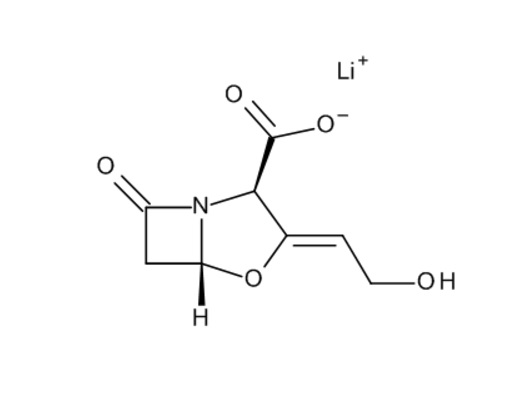 Lithium ClavulanateView Details
Lithium ClavulanateView Details
61177-44-4
